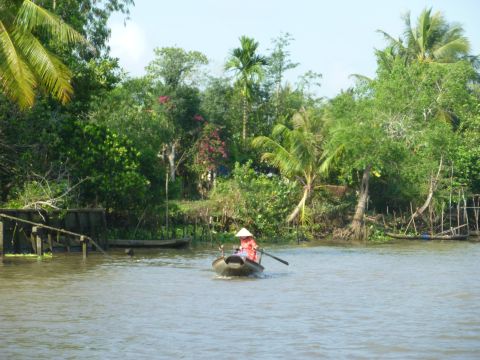So, I came back from Vietnam recently; and one of the things that happened was sitting on the sofa and trying to explain stuff to the BF–and seeing how it all came together (or not) for him. That in turn made me think of an exercise I’ve attempted several times now, which is writing stories set in France for the benefit of an Anglophone audience–and of how this didn’t quite pan out the way I’d thought it would.
It’s a very different exercise from writing in a culture not related to me, such as the Aztecs (I’ll leave aside China, which is a little more problematic for me because China gave so much to Vietnam). And this set me thinking about the different approaches to writing a culture.
To simplify matters, let’s assign letters (yup, engineer at work). Suppose we have two cultures in presence. I’ll call the first one “A” (Americans, for instance). It’s your target audience. The second one is “B”, the one you’re attempting to write about (say, Chinese, Vietnamese, French…).
If you’re a member of B, then there are a number of things that are going to be way easier for you. The small things–you’re not going to oversweat, say, what time people of B usually get up at and what they have for breakfast, because you know. The big things: your outlook on life is likely to be typical of B already. You’re not going to contaminate the narration by, say, having a Vietnamese shouting at or striking his mother (pretty much unthinkable in Confucian ideology), or thinking that good French students go to university (we don’t. It’s rather complicated, but we have a two-tier higher education system, where only the worst students go into the state universities. The best ones go into “Grandes Ecoles”, the great schools of business, engineering and literature).
There are a number of things that are going to be harder, though. For you, pretty much anything belonging to B is natural, which means that you’ll likely spend less time describing it or even mentioning it at all. When a French character of mine goes home after work, I’m not going to make a big deal of their buying bread at the bakery, because for me it’s perfectly natural. I’m going to be tempted to skip the bakery description, too, because I assume my reader will know what I’m talking about.
Of course, the problem is that maybe they won’t. Maybe they come from a place where they don’t sell bread. Maybe a French bakery–with a long counter displaying cakes and viennoiseries under glass panes, and a cash register behind which you’ll find the different kinds of bread from baguettes to loafs–isn’t a sight that’s familiar to my reader at all. What I subconsciously assume is natural to A might not be at all: it might be slightly different, it might be counter-intuitive. I don’t describe the streets of Paris, but the truth is that they’re not the same as those of Los Angeles.
It’s what I’d tend to call the “insider” point of view: the flavour of the narration is pretty much bang to rights, but it can end up feeling pretty hard to relate to for a member of A, because you’ll likely end up leaving out the details that might have made sense to A (not to mention that the attitudes of the characters will be those of B, and that A might find them hard to relate to without explanations. It’s not easy to understand why the French are so obsessed with their two-tier education system unless you’ve been there). And I think that’s why people sometimes have trouble relating to “insider” stories–because they tend not to be formulated in the frame of reference to which the people of A used.
On the contrary, if you’re a member of A writing about B is going to have to learn things the hard way, by researching the culture–and speaking as someone who has a moderate amount of experience in the subject, this could be one of those things that take years before you can be anything like remotely proficient in culture B. But the sad truth is that no matter how many years you spend researching B, you’re always going to make mistakes. Even after all that research, you’ll get some of the little details wrong: the food, the daily habits. You’ll have some of your culture creeping into mindsets (because those tend to revert pretty quickly to your default pattern unless you’re really careful about what you’re doing. I know I always have the temptation to be an advocate for women’s rights in my historical fiction, even though I know that the idea of equality between genders didn’t make its way into popular culture until, at best, the tail end of the 19th century.
You’re going to have one huge advantage over a member of B writing about B, though: you’re already part of the target audience. You know, or can pretty easily find, what members of A will find odd or non-intuitive about B. At worst, this can degenerate into exoticism, where you use B for a touch of local colour and not much else; at best, it makes you able to find the bits of B that will speak to your audience, and make those bits stand out. You have a common frame of mind with your audience, which makes you able to easily reach out to it. Also, you’ve just spent some time (months to years) learning about B–and you’ve already gone through all the hassle of understanding the parts that didn’t seem to make sense at first. You know what is striking or unfamiliar, and you will usually think of describing those in your fiction.
This is what I’d tend to call the “outsider” writing: a lot of the time, the narration will be familiar while the mindset will be anything from completely wrong to slightly off, but this will have a much more palpable flavour, at least at first read.
Obviously, for a member of A looking for an “authentic” [1] narration about B, neither insider nor outsider are really satisfying: the first lack the details/character empathy that will make them feel included in the conversation between author and reader; and the second, while much easier to get into, is ultimately rather frustrating because it’s likely to be off.
I guess the best way to be authentic would be to merge both approaches, but it’s hard–I haven’t found many books that pulled this off satisfactorily (in fact, as I’m writing this, I’m struggling to think of a single one. If you know one, please chime in). It requires you to be equally proficient in both A and B, in order to both know about B and the bits of B will appeal to A. And then we move into a whole new category of problems, the main one being separating A and B in the author’s mind (same thing for a member of B who’s been living in A for a while, and is now writing about B).
In the meantime, you’re left with those–and I guess both have their merits and their flaws. I don’t have an easy solution to this (and I certainly don’t advocate that everyone should stick to writing what they know, which makes it all too easy to keep minds closed to other ways of life and other cultures). But it certainly brings up an interesting set of problems.
What do you think? Am I just stating the obvious? Have I got it completely wrong? Are there any approaches I left out, or anything else worth pointing out?
[1]It’s not the point of this post, but I think we can argue for a long while about what “authentic” means. It’s nowhere as clear-cut as it seems, especially in the light of today’s world where you can find very distinct subcultures everywhere (if you take Asians, Asian-Americans and Asians living in Asia will have a lot in common, but also a lot of differences. And the culture of, say, my grandparents is no longer the culture of twenty-something Vietnamese, even though they both live in the same country).
When do you start being authentic–is it only when you write about the little bit of subculture that you happen to be a part of? Is it when you write about your own country of origins? What if you’re a first or second-generation immigrant, or a mixed-race? It’s a thorny subject, and it’s likely to get thornier as the world shrinks on itself and people move effortlessly across boundaries.


